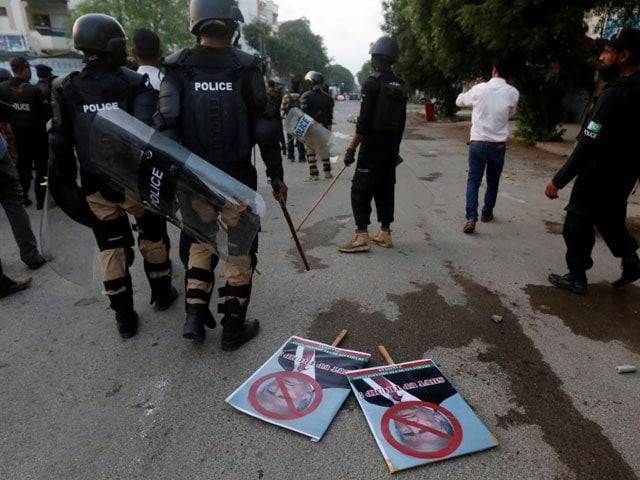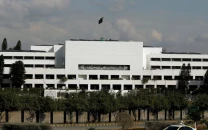Pakistan's paths beyond US-Afghan hysteria
The Islamic Republic's approach to the Trump administration must be to cultivate friendly ties

Placards are seen left after police dispersed student protesters during a rally in Karachi against US President Donald Trump on August 27, 2017. PHOTO: Reuters
For the US, Afghanistan is a piece of land where its soldiers are stuck and thus the Trump administration is neither interested in the nation building nor in its economic or societal recovery.
US official’s visit delayed to take parliament on board
Slamming the door on political solutions, the White House wants to crush the Taliban whom it legally does not consider terrorists or outlaws. ISIS Khorasan – an emerging threat in the war-torn country – has benefited from the power vacuum in Afghanistan due to Obama administration’s inaction against Bashar al Assad in Syria and installing incompetent Nuri al Maliki government in Iraq.
Whatever the generals commanding the vulnerable and demoralised US soldiers may report back home, the narrative in the White House and the State Department has consistently been to declare Pakistan as their coat hanger. Nonetheless, Islamabad’s response has been firm that the Afghan war cannot be fought in Pakistan.
Viewing from a wide angle, Trump’s outburst shoots from an assortment of foreign and security policy differences with Islamabad. Besides the country’s nuclear deterrence against India, strengthening of relations with China as both develop logistical corridor and denying Delhi Afghanistan transit corridor upset US’ geostrategic ambitions.
Scenarios Pakistan may face
Since Pak-US relations have dwindled at a steady pace year-after-year, both sides have been keeping diplomatic channels open while lessening mutual reliance.
Diversification resulting from transactional or disposable nature of ties has bred varying results for the so-called allies. Learning from the era of the 1990s, the Islamic Republic gradually reduced its dependence on the US military technology. Any prospective sanctions (though nothing is under congressional consideration so far) shall impact the country’s economic and military well-being to a lesser extent.
Trump’s Afghan strategy doomed to fail, says PM Abbasi
Washington has persistently used financial and developmental aid for direct leverage over Islamabad. Over the years, the aid volume has significantly lessened, now resting much below $1 billion. The US can still impinge upon Pakistan’s relations with western and major Muslim countries allied with it.
The rise of China, however, continues to erode Washington’s backdoor pressure on its partners. For instance, Turkey’s decision to buy Russia S-400 missile defence system while being a NATO member and housing a US strategic base in Incirlik, and Saudi Arabia’s purchase of Chinese drones besides possible arms deal with Kremlin are glaring departures from the past. One stark difference though is that Saudi Arabia and Turkey are financially thriving economies in comparison with Pakistan.
Pakistan’s vulnerability stems from its reliance on the global financial institutions for loans, where the US and other countries in its orbit have enormous weight.
The conditionalities and interest rate of loans have been used to exert pressure on weaker countries seeking bailout loans. Evidently, when a country’s trade deficit is at a record high, manipulation by powerful rivals results in compromises. Islamabad has too long suffered due to a weak economy largely due to tax evasion, apathy towards agriculture and production sectors, and white-collar corruption.
Any direct sanctions targeting Pakistan’s military industry or nuclear establishment besides enlisting certain Pakistanis or Kashmiri figures as terrorists, as a routine affair, will have limited gains for the US.
US anti-Pakistan rhetoric amid realities of CPEC
Since the Pressler Amendment, Islamabad’s addiction has shrunken in the vital spheres of the national security. But, any possible curb will be jacking up anti-US sentiments to newer heights. Trump’s threatening remarks have been received with repeated calls for diplomatic freeze and tit-for-tat reactions.
Trump, though, did not hint at India’s greater role in Afghanistan’s counter insurgency campaign, his comments were especially aimed at touching Pakistan’s raw nerve. Evidently, pro-India reference cannot go unnoticed by China, which has bigger and long-term investments in Afghanistan. Even though Washington might be ratcheting up the rhetoric, it is playing a dangerous game for Afghanistan and has more than a fair share of disruptors whom the US pledges to crush.
Pakistan between belligerence and engagement
Islamabad has been seeing it coming since Trump took over the office seven months ago. Various threat perception scenarios in the context of Afghanistan must have been worked out by the foreign as well as defence ministries. Before dwelling on them, the political response needs to be examined.
Religio-political parties, vaguely clubbed as ‘Islamists’, have taken to the streets in smaller numbers seeking hostile response towards the US. The so-called liberal ones like Pakistan People’s Party (PPP) have not been mincing words either. Its leader and Senate Chairman Raza Rabbani has called upon the foreign minister to cancel his official visit to the US. Delaying the sojourn, Foreign Minister Khawaja Asif has planned visits to Turkey, China and Russia for consultations. Prime Minister Shahid Khaqan Abbasi has already consulted the Saudi Arabian crown prince during a daylong visit. The rescheduling of a US State Department delegation also conveys Islamabad’s reaction to Trump’s remarks.
If the general political discourse can be any guide, it becomes apparent that hot-headed politicians and a section of the emotive public seem keen to adopt an Iran-style combative and revengeful approach.
World responds to Trump's new Afghan strategy
The post-1979 Tehran and Islamabad have a different history of relations with the US. Shia clerics had unlawfully taken the US embassy staff hostage after the blood-soaked coup followed by various back-to-back responses. Both never resumed diplomatic relations.
Relations between Pakistan and the US have generally been friendlier and multifaceted. People-to-people contacts have never been influenced even when the state-to-state affairs withstood quite a few lows. It is in Islamabad’s interest to take a route of more pro-active diplomacy than of withdrawal and whimsical. The White House must not constrain its vision with Afghanistan imbroglio and repair its image within the world’s sixth most populous nation.
General John W Nicholson Jr, also called referred to as a ‘thinker warrior’ amongst cliques, is a capable commander who is not only averse to the complexities of Afghanistan but also the dynamics of the country’s neighbourhood. His recent statement about the presence of Taliban leaders in Peshawar and Quetta speaks of his frustration in the fight than prudence and reality.
As much as Trump’s statement gave a hint about his administration’s inclination towards India, it also provided little details about the strategy after additional troops would be deployed. This may very much be US’s last chance to deliver.
Bringing peace to Afghanistan does not require enflaming a war with a vital neighbour.
General HR McMaster, who has proven his mettle beyond his peers, will use the lessons drawn from his Vietnam War research in policy recommendation and strategic decisions ahead. General Mattis will prove to be a tough negotiator but with the sole purpose of stability and devise a successful exit strategy. The US government can either fight a bloody war alone or seek Islamabad and Beijing’s assistance in working towards a political solution. The tough talk can only go so far.
Won’t allow Afghan war to spill into Pakistan, says COAS
The Taliban have held rounds of talks with China last year. Why won’t the militia use Beijing and Islamabad as mediators or guarantors for future peace talks?
If the US resumes drone strikes inside the tribal areas, Pakistan may deny logistical corridor to its military. However, the White House will stand vindicated if drones manage to take out Haqqani group operatives on the Pakistani soil.
If the US administration shelves political settlement altogether, Pakistan and China can continue peace talks with the Taliban and Kabul. Gulbadin Hikmatyar’s entry into the mainstream politics cannot be ignored as he poses a significant challenge to his rivals in next year’s parliamentary elections.
Russia and Iran remain key disruptors in Afghanistan’s immediate neighbourhood, seeking humiliation and entanglement of the US troops. Pakistan cannot go farther with the duo given their destructive and revengeful agenda. Nurseries of rogue militias across the Durand Line will be detrimental to its internal peace and development including the CPEC.
Overall, Pakistan’s relations with the US are neither subjected to Trump’s determination nor ‘Islamists’ emotive rhetoric.
The Islamic Republic's approach to the Trump administration must be to cultivate friendly ties. Both the establishments have learned their lessons from their experiences based on transactional relations.
Unlike Pakistan, India is devoid of strategic instruments or geography to alter the strategic landscape of the region. For its own existential and geopolitical concerns, the more India nears the US, the tighter Pakistan’s China embrace will be. And, this is the ground reality Washington and Delhi both are finding hard to acknowledge.
The writer is a Pakistani investigative journalist and academic with extensive reporting experience in the Middle East and North Africa. He is based in Doha and Istanbul and tweets @naveed360



















COMMENTS
Comments are moderated and generally will be posted if they are on-topic and not abusive.
For more information, please see our Comments FAQ